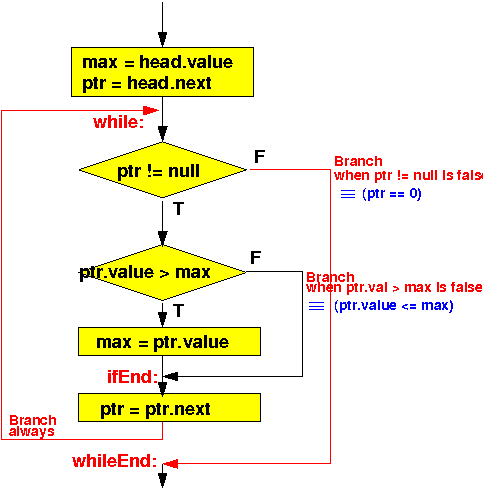Problem description:
|
Simplication: we will assume that the linked list is not empty (i.e.: head ≠ null)
Algorithm to find the maximum of a series of values:
max = first value in the serie
for nextValue = 2nd, 3rd, ...., last value in serie do
{
if ( nextValue > max )
max = nextValue;
}
|
This algorithm will find the maximum value in any data structure
The only adaptation that you need to make is: use a data structure specific access method to access the value field.
Find maximum algorithm for a linked list (adjust how to find the value);
// Assume we have a NON-empty list at head !!!
int max;
List ptr;
max = head->value; // first value in linked list
ptr = head->next; // Prepare ptr to traverse the list
while ( ptr != NULL )
{
if ( ptr->value > max )
max = ptr->value;
ptr = ptr->next;
}
|
(Draw the flow chart)
Flow diagram of the find maximum program: (click to pull out)

How I created a non-empty linked list in assembler:
head: .4byte p0
// head contains the address of the first list elem
// I created: head->[34]->[-9]->[99]->[78]->[55]
// list structure is: [value (int), next (link)]
p0: .4byte 34, p3 // p0 contains [34, p3]
p1: .4byte 99, p2 // p1 contains [99, p2]
p2: .4byte 78, p4 // p2 contains [78, p4]
p3: .4byte -9, p1 // p3 contains [-9, p1]
p4: .4byte 55, 0 // p4 contains [55, null]
|
main:
// max = head.value; - always execute the RHS first !!!
movw r0, #:lower16:head
movt r0, #:upper16:head
ldr r0,[r0] // r0 = head
ldr r0,[r0, #0] // r0 = head.value
movw r1, #:lower16:max
movt r1, #:upper16:max
str r0,[r1]
// ptr = head.next
movw r0, #:lower16:head
movt r0, #:upper16:head
ldr r0,[r0] // r0 = head
ldr r0,[r0, #4] // r0 = head.next
movw r1, #:lower16:ptr
movt r1, #:upper16:ptr
str r0,[r1]
while: // START of while loop
// Test while condition ptr != null
movw r0, #:lower16:ptr
movt r0, #:upper16:ptr
ldr r0, [r0] //r0 = ptr
cmp r0, #0
beq whileEnd // If ptr == null: exit while loop
/* ***********************************
While body
*********************************** */
// if ( ptr.value > max )
//// Get ptr.value (use base + offset access technique !)
movw r0, #:lower16:ptr
movt r0, #:upper16:ptr
ldr r0, [r0]
ldr r0, [r0, #0] // r0 = ptr.value
//// Get max
movw r1, #:lower16:max
movt r1, #:upper16:max // r1 = addr(max)
ldr r1, [r1]
//// Compare ptr.value (= r0) < max (= r2)
cmp r0, r1
ble ifEnd
/* ********************************************
Then-part: max = ptr.value
******************************************** */
movw r0, #:lower16:ptr
movt r0, #:upper16:ptr
ldr r0, [r0]
ldr r0, [r0, #0] // r0 = ptr.value
movw r1, #:lower16:max
movt r1, #:upper16:max
str r0, [r1]
ifEnd:
// ptr = ptr.next
movw r0, #:lower16:ptr
movt r0, #:upper16:ptr // r0 = addr(ptr)
ldr r1, [r0]
ldr r1, [r1, #4] // r1 = ptr.next
str r1, [r0]
// End of while body --- branch back to test !!
b while
whileEnd:
/* --------------------------------------------------
Begin of the permanent program variables
-------------------------------------------------- */
.data
ptr: .skip 4
max: .skip 4
head: .4byte p0 // head contains the address of the first list elem
// head->[34]->[-9]->[99]->[78]->[55]
// list structure is: [int value, next]
p0: .4byte 34, p3 // p0 contains [34, p3]
p1: .4byte 59, p2 // p1 contains [99, p2]
p2: .4byte 66, p4 // p2 contains [78, p4]
p3: .4byte -9, p1 // p3 contains [-9, p1]
p4: .4byte 50, 0 // p4 contains [55, null]
.end
|
/home/cs255001/demo/asm/7-while/max-list.s